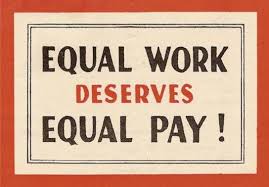Equal Pay and Prior Salaries

Most American workers know that discrimination based on sex is illegal in the work place. Many also know about the existence of a federal law called the Equal Pay Act, which was passed in 1963 in an effort to eliminate the gender pay gap. Under the Equal Pay Act, employers are generally required to pay men and women the same pay for the same work, with exceptions. Is an employee’s prior rate of pay with a previous employer a factor that can be used to justify paying men and women different rates for the same work?
The Equal Pay Act has four factors that employers can rely upon to pay men and women differently for the same work. Those factors are 1) a seniority system; 2) a merit system; 3) a system which measures earnings by quantity or quality of production; or 4) a differential based on any other factor other than sex. So, for example, assume a company hires both Mr. Man and Ms. Woman to be line workers in a factory. If they are identical as employees in all ways but sex, they must be paid at the same rate of pay. However, the company could pay Mr. Man more than Ms. Woman if he has been there longer, as long as the company is following a bona fide seniority system that makes it so Ms. Woman would have been paid the same amount if she started at the same time. The company can also use objective factors of merit, such as results on unbiased performance reviews. Another factor the company could use is quantity or quality of production. For Mr. Man and Ms. Woman, that may mean how much they get done on the factory floor or how many errors there are in their work. Finally, there is a fourth catch-all factor that can be used to pay the employees different rates- “any other factor other than sex.” Some factors other than sex would be clear, unbiased reasons to pay one employee more than another. An example of this would be education. If Mr. Man has only a high school diploma and Ms. Woman has a college degree, the company could legally use that as a basis to pay Ms. Woman more than Mr. Man for the same work without violating the Equal Pay Act.
So, back to the original question. Can an employer consider an employee’s prior rate of pay as a factor without violating the Equal Pay Act? The answer may depend on where you live. The Ninth Circuit Court of Appeals recently issued a decision saying that employers may NOT rely on an employee’s prior rate of pay as the reason for paying one employee less than another if the pay discrepancy would otherwise violate the Equal Pay Act. The reason for this is that “prior pay may carry with it the effects of sex-based pay discrimination, and because sex-based pay discrimination was the precise target of the EPA, an employer may not rely on prior pay to meet its burden of showing that sex played no part in its pay decision.” Right now, women earn about $0.81 for every dollar men earn. Allowing employers to use new employees’ prior pay rates perpetuates the cycle of women being paid less than men. The Ninth Circuit held that paying a woman less than a man for the same work because of her prior rate of pay violates the Equal Pay Act.
However, other courts have previously made different decisions on this same issue. The Fourth, Seventh, and Eighth Circuits have all allowed an employee’s prior pay to be used as a factor in setting pay and have considered it to be a valid defense to an Equal Pay Act claim. The Sixth Circuit, where Michigan is, as well as the Tenth and Eleventh, have found that employers did not violate the Equal Pay Act when prior pay was considered alongside other factors, but have not found that it can be used as the only factor for a pay discrepancy.
What does this mean for you? If you are an employee who is being paid less than coworkers doing the exact same job because of sex, you may have an Equal Pay Act claim. It is not illegal for your employer to pay you less than similarly situated coworkers based on seniority, merit, or work product, or certain other objective factors. If you are in a situation where you believe you are being paid less based on your sex, call Gold Star Law to see if you have a claim under the Equal Pay Act.


